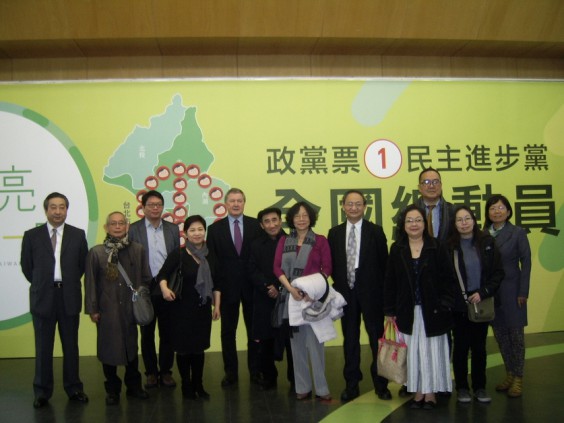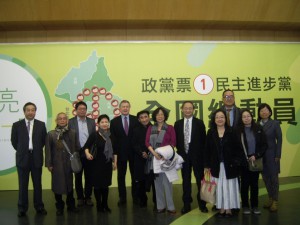“I am very, very sorry… I am proud to be Chinese.”
by Tienchi Martin-Liao / February 5, 2016 / No comments
Reflections on Taiwan’s recent groundbreaking election.
It was an amazing experience to be an observer to the Taiwan election. Together with a small group of writers and politicians from Europe and Japan, we had the chance to witness the peaceful and passionate election in Taiwan in mid-January. The landslide victory of the Democratic Progressive Party (DPP) was already prognosticated by several poll institutes weeks ago. Tsai Ing-wen became the first female president, meeting all expectations, yet the results in the parliament election were still quite astonishing. The ruling party Kuomintang (KMT) has lost almost 50 percent from its original 64 seats down to 35 seats, giving the DPP to get a comfortable 68 of 113 majority. More stunning is the newly founded (as of January 25, 2015) so called third forces. Some of the young leaders of the New Power Party are coming from the Sunflower Movement. They have won 5 seats and became the third political force in parliament.

- During the Cultural Revolution, people were sentenced to death or outright murdered because of one wrong sentence. In China today writers do not lose their lives over their poems or articles; however, they are jailed for years. My friend Liu Xiaobo for example will stay in prison til 2020; even winning the Nobel Peace Prize could not help him. In prison those lucky enough not to be sentenced to hard labor play “blind chess” to kill time AND TO TRAIN THE BRAIN NOT TO RUST. Freedom of expression is still a luxury in China. The firewall is everywhere, yet words can fly above it and so can our thoughts. My column, like the blind chess played by prisoners, is an exercise to keep our brains from rusting and the situation in China from indifference.

- Tienchi Martin-Liao is the president of the Independent Chinese PEN Center. Previously she worked at the Institute for Asian Affairs in Hamburg, Germany, and lectured at the Ruhr-University Bochum from 1985 to 1991. She became head of the Richard-Wilhelm Research Center for Translation in 1991 until she took a job in 2001 as director of the Laogai Research Foundation (LRF) to work on human rights issues. She was at LRF until 2009. Martin-Liao has served as deputy director of the affiliated China Information Center and was responsible for updating the Laogai Handbook and working on the Black Series, autobiographies of Chinese political prisoners, and other human rights books. She was elected president of the Independent Chinese PEN Center in October 2009 and has daily contact with online journalists in China.
Today’s Taiwan is one of the most dynamic places I know. It’s a modern industrial country with humane countenance and some remnants of traditional agriculture and traditional Chinese aspects, such as its written characters. When I was in secondary school and in university in the 1960s, Taiwan still stood under martial law. It experienced severe censorship, had no freedom of expression, and the whole society was in an atmosphere of doom and gloom. Even the economy was stagnated and underdeveloped.
With the excuse of protecting the country from “communist aggression,” secret police came to the university dormitory and took “suspicious” students away. One of my older siblings’ friends, a certain Mr. Wu, disappeared one night. Later we heard that he had been kept in a detention center, and later brought to Lyudao Prison on the small Island of Fire, 21 miles southeast of Taiwan. When we saw him 14 years later, he was an old man with grey hair and angular face. He had spent his youth behind bars for dubious accusation that he had some connection with the “communist-bandit” in China.
And there was the February 28 incident. Chiang Kai-shek, then the leader of the Republic, sent troops to Taiwan in 1947 before he finally lost the power to the Communists on the Mainland. These troops, known as the KMT-troops, suppressed the uprising on the island and killed thousands of inhabitants. The massacre was the beginning of the period known as The White Terror on the island. Taiwanese elites vanished behind bars. Fear and hatred divided the society into two main groups, the local Taiwanese and Chinese, who came to the island with Chiang Kai-shek around 1949.
The authoritarian system ended in 1987 when Jiang Jingguo terminated the martial law and introduced the press freedom and allowed other political parties to operate. This historical step allowed Taiwan to step into the global group of democratic countries. The KMT party has officially apologized to the Taiwanese for the February 28 incident (also known as the 228 incident) and launched an investigation and compensation act, which has continued until today. The gap between Taiwanese and Chinese has finally been leveled off. After almost three decades of practice, Taiwan has a mature and steady democratic system, with the ruling power shifting between the two largest parties, KMT and the Democratic Progressive Party (DPP).
Walking on Taipei’s street, you can talk to any person–peddler, housewife, taxi driver or student–and find that they all have their own opinion on politics. What are their main worries? They include the deteriorating economic situation, the intellectual drain to mainland China, the capital outflows and economic dependence on China, the need for renewable energy and more. I’ve gotten the impression that China’s military threat is not causing too much fear.
Recently, I participated in a roundtable discussion at National Chengchi University “Well, don’t we have the Taiwan Relations Act with the United States?” students asked. The answer, however, is no. Taiwan cannot afford military competition. During the election campaign, there were lots of issues around the relationship between China and Taiwan, the rectification of Taiwan’s status quo, the economic tie, the tourism, the educational and employment exchange, and so on, but much less discussion about the potential military conflict. People believe that Taiwan is too important geopolitically for Japan and US to let it fall into China’s hands. Is this blind optimism or opportunism? It is difficult to tell.
Although the Taiwanese have a strong sense of civic participation and care about their political future as well as the issue of security, the voter turnout was no more than 67 percent. One reason for this is that postal vote was not allowed. Each voter had to present his/her ID personally at the polling station. The railway service was overloaded on election day, because people had to go back to their registered city and district for the voting. As for the 500,000 Taiwanese business people and their families living on the Mainland, only a very low percentage came back for voting. However, the main concern in regards to postal voting is that China could manipulate the votes and therefor, the results of the election.
This year, an unexpected incident influenced the election at the last moment. A 16 year old Taiwanese pop singer, Zhou Ziyu, held a Taiwanese flag on the stage along with other international artists, during a performance in Korea. For this act, she was accused by the Chinese authorities of showing support for Taiwan’s independence. Ziyu had to apologize publicly. She had to bow in front of the camera and read a given text: “There is only one China, on both sides of the Taiwan Strait. I am proud to be Chinese. As a Chinese person participating in activities in a foreign country, I made a mistake in my behavior and my words. I have hurt the feelings of citizens on both sides. I am very, very sorry for this. I feel ashamed.”
This video appeared one day before the election. The effect was explosive. Many young people in Taiwan felt that their identity and dignity as Taiwanese was hurt, therefore they gave their vote to Mrs. Tsai Ing-wen. She represents the principle that Taiwan is Taiwan, not China. She also promised, on the evening of her victory, that she would work hard so that in the future, a Taiwanese citizen does not have to apologize for his or her Taiwanese identity. Tsai, a professor of law and economics, became a politician no more than fifteen years ago, but is already known for her rational manner and intelligence. Beijing is flabbergasted that Taiwan has elected the first female president in modern Chinese history, and so is the international community. Expectations are high, but time will prove that Taiwan’s people have made a good decision.






